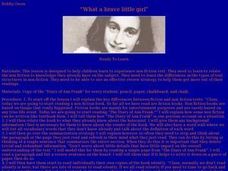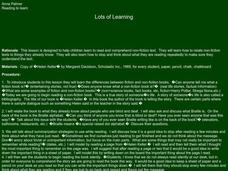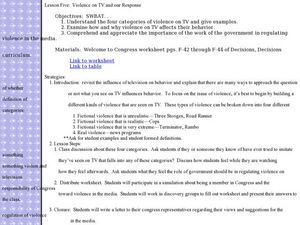Curated OER
News real?
Students distinguish and evaluate information from various sources and determine whether the information found is fiction or facts. They also view television shows, radio stations and newspaper articles Internet sites are also visited by...
Curated OER
What a Brave Little Girl
Students practice relating non-fiction to knowledge they already have on the subject. They evaluate differences in the types of text structrures in non-fiction. They employ a review strategy that allows them to understand their reading.
Curated OER
Reading to Learn
Children learn to read and comprehend non-fiction text and explore how to relate non-fiction texts to things they already know. They then examine how to stop and think about what they are reading repeatedly to make sure they understand...
Curated OER
The Wonderful Pigs of Jillian Jiggs
First graders compare fictional and real pigs. In this pig comparison lesson, 1st graders read a fiction text then a non-fiction text on pigs. Students complete a K-W-L chart and fill out a Venn Diagram.
Curated OER
A Swiftly Tilting Planet
Young scholars familiarize themselves with science fiction/fantasy literature. They create an awareness of the different types of literature, develop an appreciation for them and be able to tell them apart. Students realize that science...
Curated OER
Under The Sea
In this resource lesson plan, young scholars use non-fiction books to research ocean animals. Students discover the many features of non-fiction books and how to use these features to help them conduct research. Young scholars then...
Curated OER
Reading and Responding: Lesson 24
Fourth graders explore fictional literature. They read a fictional passage and practice answering multiple choice questions about the text they read. Students complete short answer questions.
Curated OER
Violence on TV and Our Response
Students examine violence on television. In this media awareness lesson, students discuss the types of fictional and realistic violence shown on American television. Students participate in a Congressional simulation activity on the...
Curated OER
Jamestown Fort: Finding History
Students identify artifacts discovered from the exploration of the Jamestown fort in order to help them create a short fictional account about the lives of Jamestown's first inhabitants. In this history lesson, students research the...
Curated OER
Transitioning Between Scenes
Students create a chart to reference when writing new scenes in fiction stories. In this fiction writing lesson plan, students are exposed to various ways to transition between scenes in their writing. There is a Word...
Curated OER
Analyzing Irony in Nonfiction
Students examine the use of irony in non-fiction works. In this literature lesson, students read non-fiction war texts and explore the use of irony in the piece as they respond to discussion questions.
Curated OER
Folktales around the World (Middle, Reading/Writing)
Students analyze, synthesize, and use the elements of various US cultural folk tales to describe the elements of fiction in general and in folk tales specifically.
Curated OER
Summarize This!
Students explore how to summarize a reading passage. They read non-fiction books. Students use a Venn Diagram to compare and contrast the two animals they read about. They write a summary using the information in their Venn Diagram.
Curated OER
A Character's Decalogue Using "Because of Winn Dixie"
Students read the book Because of Winn Dixie and then create a personal decalogue, which is a list of 10 personal beliefs. In this decalogue lesson plan, students then write a decalogue of a fictional character and write a story based on...
Curated OER
Natural Disasters: An Adventure in Non-Fiction
Students study different natural disasters. In this natural disaster lesson students read a nonfiction book followed by a discussion, an experiment, then collect illustrations from their experience.
Curated OER
Mosaic America on Film: Fact Versus Fiction
Seventh graders define race, ethnic group, and culture. They identify the ways in which words are used in political cartoons and examine the way visual elements in a cartoon determine the meaning of words and enhance their impact. They...
Curated OER
From Fact to Fiction: The Origins of Constellations
Sixth graders investigate the constellations. In this constellations lesson, 6th graders discover where the constellations are located and the myth associated with them. Students create their own myth and make a slide show about stars...
Curated OER
TELL THE SEQUENCE IN AN ORAL REPORT
Second graders survey a favorite story he/she has read or heard read aloud. They use the graphic organizer to draw illustrations that show the beginning, middle and end of the story. They tell the title of the story, whether it is...
Curated OER
Fact or Fiction? Urban Legends and Misconceptions
Students are introduced to a process for using web site resources to verify the accuracy of biology information. They follow a guided lesson on evaluating web sites and determining content accuracy. They select a piece of unusual biology...
Curated OER
Causes
Things usually don't happen without a reason; usually any event has a cause that got the ball rolling. The book, If You Give a Mouse a Muffin is used to help learners understand the concept of causes in literature. Examples from the...
Curated OER
Lesson 3: Cause and Effect Relationships
The Gunniwolf is a book full of events that get kids asking why and what. They note several events on a chart, and then discuss how they think the instructor is able to determine the causes and effects they find. They continue...
Curated OER
Identifying Plot Conflicts
Fifth graders identify plot conflicts in the text. In this plot conflict lesson, 5th graders read Dogs Don't Tell Jokes and recognize examples of character vs. self and character vs. character.
Curated OER
Analyzing Relationships
Fifth graders analyze character relationships. In this analyzing relationships lesson, 5th graders read The Great Gilly Hopkins and describe how the characters feel about one another as well as the positive and negative aspects of...
Curated OER
Lesson Plan 1: Introducing NaNo and Novels
Did you know that November is Novel Writing Month? In the first of a series of lessons, class members are introduced to the NaNoWriMo (National Novel Writing Month) project.
Other popular searches
- Non Fiction
- Historical Fiction
- Science Fiction
- Non Fiction Text Features
- Realistic Fiction
- Fiction and Nonfiction
- Elements of Fiction
- Fiction or Nonfiction
- Non Fiction
- Fictional Narrative
- Non Fiction Writing
- Teaching Historical Fiction























